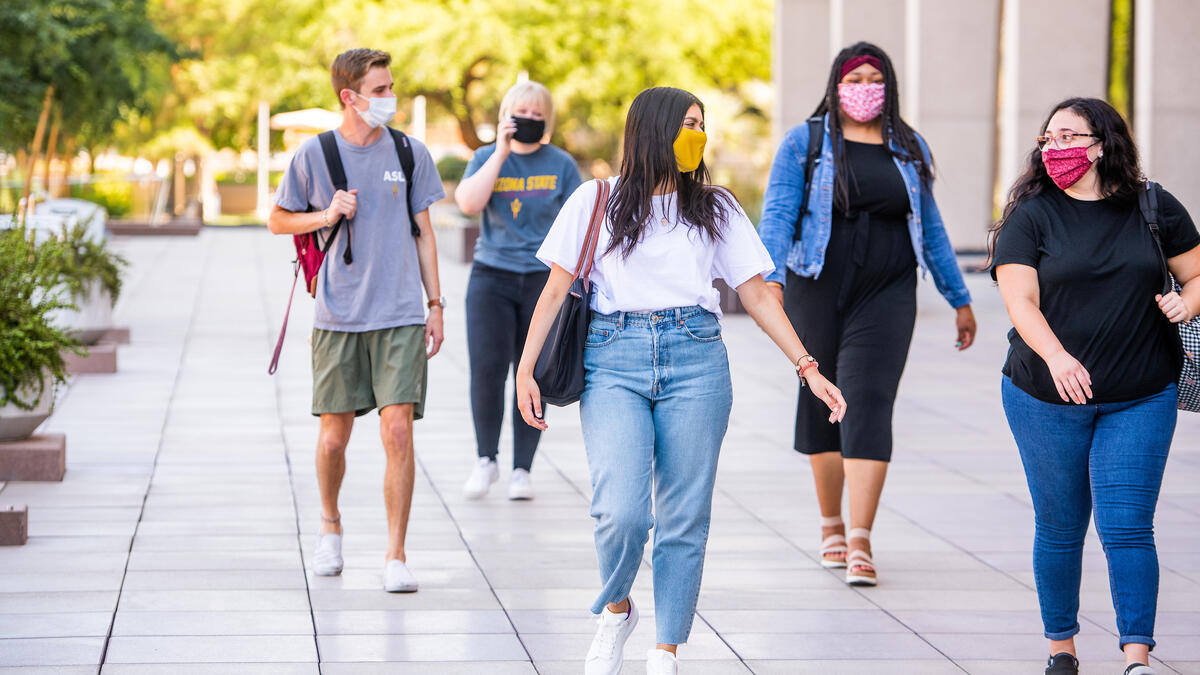In another record-breaking year for enrollment, Arizona State University has welcomed its largest cohort of first-year on-campus students. However, they’re not the only ones who are new kids on the block; this year, many second-year students will be experiencing in-person college life for the first time after spending their first year learning virtually.
That can come with its own unique set of challenges, said Kevin Correa, director of the Student Success Center. In fact, the center recently changed its name from the First-Year Success Center, in part to recognize the unprecedented situation many students are finding themselves in, but also to reflect the diverse populationThe Student Success Center is part of University College, and the work they do, including a variety of enhancements made over the past two years, is part of the overall redesign of University College, with the aim of ending achievement gaps for students of all backgrounds. of students they serve, including first-generation and transfer students.
ASU News tapped Correa, W. P. Carey School of Business Associate Professor Ned Wellman and student success coach Amber Layne for advice on common mistakes to avoid and tips on how to be successful, both in and out of the classroom.
One of the biggest concerns coaches at the Student Success Center get from students is time management.
“The amount of work and time necessary to be successful at the university level is much different than the high school level,” Correa said. “In high school, oftentimes you hear students say they’re able to get away with cramming the night before or doing an assignment the day it’s due. In college, that just doesn’t work. So that can be a big adjustment.”
Layne said she expects to see even more issues with time management this year.
“Students have to commute again; they’re not going to be able to just roll out of bed and go to class on their computer,” she said.
I think the biggest thing is to understand is that everyone, when they’re getting ready to do important things, has doubts or misgivings. But there is research to suggest that if you’re anxious about something, reframing that feeling as excitement actually helps change your mindset.”
— W. P. Carey School of Business Associate Professor Ned Wellman
In addition, many students are returning to work and extracurricular activities on top of school, and that can lead to more stress and anxiety than usual, which in turn can cause them to struggle with motivation and focus.
To prepare for that, student success coaches went through a week of training ahead of this semester to recognize where students are at in this moment.
“We want to normalize that conversation for students who are feeling that way,” Correa said. “We want to make sure they know they’re not the only ones, and that it’s perfectly OK to feel that way.”
That said, Correa advocates adopting a growth mindset, which embraces the idea that new skills can be developed through practice and effort, as opposed to a fixed mindset, which assumes those kinds of skills are innate.
Wellman, who investigates the qualities of good leaders and has consulted across a variety of industries, including such clients as Intel, NASA and American Express, has conducted research that looks at how much of a person’s success can be attributed to personality versus behavior. He found that only about 20% comes from the personality you’re born with, while about half comes from behavior.
“So learned behaviors are more than twice as important as any skills you’re born with,” Wellman said.
How does one go about learning behaviors like confidence, time management and focus?
“You just have to practice,” Wellman said, “and over time, you’ll get better and feel more comfortable with it. I think the biggest thing is to understand is that everyone, when they’re getting ready to do important things, has doubts or misgivings. But there is research to suggest that if you’re anxious about something, reframing that feeling as excitement actually helps change your mindset.”
If anyone can relate to feelings of having the deck stacked against them, it’s Layne. When she started as a student at ASU, she was nontraditional in many ways: She was an older student, beginning her studies later in her 20s; she was a first-generation student and she was a transfer student from a community college.
If you knew everything you needed to know in college, you wouldn’t need to come to college. ... So ask questions when you’re not sure, and ask them early and often. Don’t wait until the end of semester to get resources that could have helped earlier.”
— Student success coach Amber Layne
She became a student success coach because she was struggling to make friends.
“What really inspired me was I didn’t want any other student to be in the position I was in, where I was feeling kind of lost and like I didn’t fit in at the university,” Layne said.
Today, she is a graduate student at the Mary Lou Fulton Teachers College and said she has made some of her best friends through connections made at the Student Success Center, where every coach is also an ASU student (mostly seniors, but like Layne, there are some grad student coaches).
“That’s part of the design,” said Correa. “Because then our coaches can easily relate to what students are going though, because they have been through it, too. And because students have the same coach all year long, it makes for a great personal connection.”
Layne encourages anyone anxious about making friends to just be themselves.
“If you are trying to be someone different in order to get people to like you, they’re actually getting to like a person you think they want you to be,” she said. “And that doesn’t set anyone up for success. It creates artificial friendships. So if you’re weird, lean into it. We’re all weird in some way, and we all struggle with the same things.”
As for students whose concerns skew more academic, Layne said, “Know that at least one other person has the exact same question as you, and there are no stupid questions. If you knew everything you needed to know in college, you wouldn’t need to come to college. Not knowing something is an incredible opportunity to learn, and that’s why we’re all here. So ask questions when you’re not sure, and ask them early and often. Don’t wait until the end of semester to get resources that could have helped earlier.”
Correa emphasizes that you don’t need to be struggling to benefit from seeing a student success coach, either.
“It’s a common misconception that a coach is only for people struggling,” he said. “That’s just not the case. Students with 4.0 GPAs see coaches and benefit as well. Our main purpose is that we just want to be of value to students.”
The Student Success Center has locations on all four Phoenix metropolitan campuses, and coaching sessions are available in person, virtually or over the phone.
For even more advice on adjusting to college life, check out the ASU Adulting 101 blog to learn some of the things not taught in class.
Top photo courtesy of ASU Enterprise Marketing Hub
More Health and medicine

ASU teams up with Maricopa County to address local life expectancy gap
Arizona State University’s College of Health Solutions is partnering with the Maricopa County Board of Supervisors to address a 14-year life expectancy gap between residents of north Scottsdale and…

ASU professor named Rural Health Fellow
If you live in a major city, chances are you don’t spend much time thinking about what happens in smaller towns and rural areas. But Aaron Guest, an assistant professor at Arizona State…

The rise of NoLo: Many young people opting to reduce alcohol consumption
This month, the U.S. surgeon general released a new advisory on the link between alcohol and cancer risk.The advisory includes a series of recommendations to increase awareness of the link, including…
